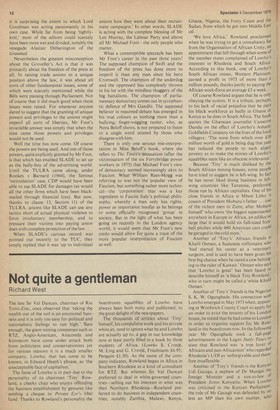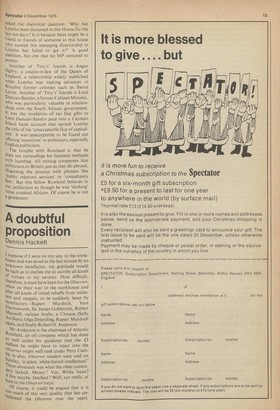Not quite a gentleman
Richard West
The late Sir Val Duncan, chairman of Rio Tinto-Zinc, once observed that 'taking the wealth out of the soil is an emotional business and it is only too easy for political and nationalistic feelings to run high.' Sure enough, the giant mining companies such as RTZ, Anglo-American, Anaconda and Kennecott have come under attack both from politicians and conservationists yet for various reasons it is a much smaller company, Lonrho, that has come to be known, in Edward Heath's phrase, as 'the unacceptable face of capitalism.'
The fame of Lonrho is in part due to the personality of its chairman 'Tiny' Rowland, a cheeky chap who enjoys offending the business establishment by gestures like sending a cheque to Private Eye's libel fund. Thanks to Rowland's personality the boardroom squabbles of Lonrho have always been both noisy and publicised, to the great delight of the newspapers.
The thousands of articles about 'Tiny' himself, his compulsive work and his private white jet, tend to ignore what he and Lonrho are actually up to, a gap in our knowledge now at least partly filled in a book by three students of Africa. (Lonrho S. ('ronje, M. Ling and G. Cronje, Friedmann £6.95; Penguin £1.50). As the name of the company indicates, Rowland began in Africa in Southern Rhodesia as a kind of consultant for RTZ. But whereas Sir Val Duncan preferred to deal in white-governed countries--selling out his interests in what was then Northern Rhodesia—Rowland preferred to do business in independent countries, notably Zambia, Malawi, Kenya,
Ghana, Nigeria, the Ivory Coast and the Sudan, from which he got into Middle East oil.
'We love Africa,' Rowland proclaimed when he was trying to get a consultancy fee from the Organisation of African Unity, an appointment that fell through when some of the member states complained of Lonrho's interests in Rhodesia and South Africa. According to this book, one of Lonrho South African mines, Western Platinunl, earned a profit in 1973 of more than a million pounds, thanks partly to paying the African work-force an average £3 a week.
Of course Rowland argues that he is onlY obeying the system. It is a tribute, perhaps, to his lack of racial prejudice that he pays his black workforce as badly in Ghana or Kenya as he does in South Africa. The book quotes the Ghanaian journalist Cameron Duodu on the effect of Lonrho's Ashanti Goldfields Company on the lives of the local villagers: 'The mine from which over £10 million worth of gold is being dug this year has reduced the people to such abject poverty as to make the stories of Lonrho 's squabbles seem like an obscene irrelevance.
Because 'Tiny' is much disliked by the South African mining houses, some people have tried to suggest he is left-wing. In fact he has never liked doing business in leftwing countries like Tanzania, preferring those run by African capitalists. One of his close friends in Africa is Mboti Litho *a cousin of President Mobutu's father ... one of the richest men in Zaire, after Mobutu himself' who owns 'the biggest supermarket anywhere in Europe or Africa, an edifice so large that it would hold six full-sized football pitches while 480 American cars could be garaged in the cold stqre.'
Another of 'Tiny's' African friends is Khalil Osman, a Sudanese millionaire wh° 'had started his career as a veterinary surgeon, and is said to have been given his first big chance when he cured a cow belonging to the ruler of Kuwait.' Osman who says that 'Lonrho is great' has been heard t° describe himself as 'a black Tiny Rowland,' who in turn might be called a 'white Khalil Osman.'
Another of 'Tiny's' friends is the Nigerian S. K. W. Ogungbade. His connection with Lonrho emerged in May 1973 when, appearing at Woolwich County Court to apply fOr an order to evict the tenants of his London house, he stated that he had come to London in order to organise support for Mr Rowland in the boardroom row. In the following year Mr Ogungbade took a full-page advertisement in the Lagos Daily Times t° state that Rowland was 'a true lover of Africans and pan-Africanism' who regarded Rhodesia's U DI as 'unforgivable and therefore insufferable.'
Another of 'Tiny's' friends is the Kenya° Udi Gccaga, a nephew of Dr Mungai the foreign Minister and , a son-in-law 0' President Jomo Kenyatta. When Lonrho was criticised in the Kenyan Parliament, the role of Mr Gecaga was defended by n° less an MP than his own mother, who
asked the rhetorical question: 'Why has Lonrho been discussed in this House for the last ten days? Is it because there might be a friend or friends of someone in this house Who wanted this managing directorship in Lonrho but failed to get it ?' A good question, but one that no MP ventured to answer.
Another of "Tiny's' friends is Angus Ogilvy, a cousin-in-law of the Queen of England, a relationship widely publicised When Lonrho was making advances in Royalist former colonies such as Sierra Leone. Another of 'Tiny's' friends is Lord Durican-Sandys, a former Cabinet Minister, Who was particularly valuable in relationships with the South African government. It was the revelation of s tax free gifts to Lord Duncan-Sandys paid into a Cayman Island bank account that earned Lonrho the title of the 'unacceptable face of capitalism.' It was unacceptable to be found out offering 'incentives' to politicians, especially English politicians.
The trouble with Rowland is that he does not camouflage his business methods With humbug. All mining companies hire Politicians in Britain just as they do abroad, disguising the process with phrases like Public relations services' or 'consultancy fees.' But this fellow Rowland behaves to °lir politicians as though he was 'dashing' some crooked African. Of course he is not a gentleman.







































 Previous page
Previous page